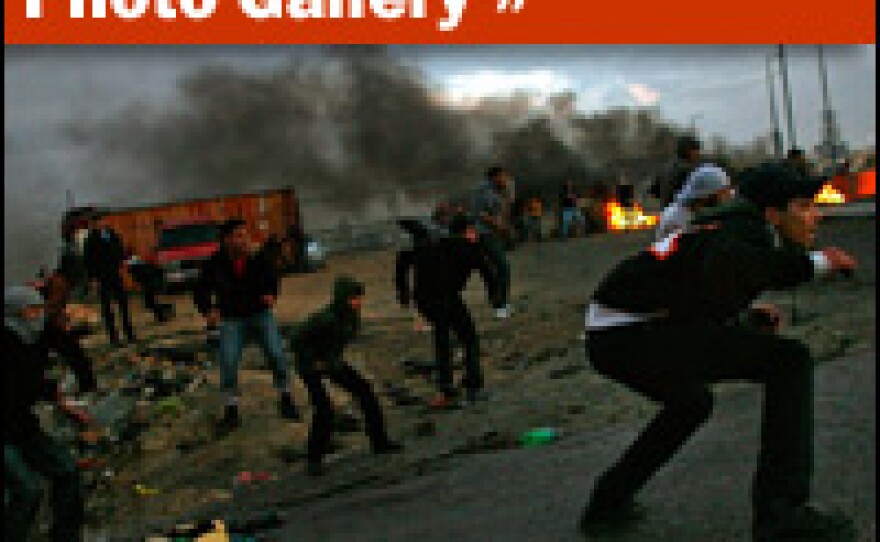It's unknown whether diplomacy will lead to an end of Israel's bombing campaign against Gaza. A French proposal for a 48-hour cease-fire has been rejected by Israel, and now Arab foreign ministers are gathering Wednesday in Cairo, Egypt, to decide what they want to do.
The Palestinian casualty figures now stand at more than 370 dead and at least 800 wounded. A few dozen wounded Palestinians have made it to hospitals in neighboring Egypt for treatment, bringing with them grim tales of conditions inside Gaza.
The Nasser Institute is a large medical complex that sits along the Nile River. Its specialists have been on alert for an influx of wounded Palestinians, but so far only about 25 have arrived.
In one room, 41-year-old construction worker Aala Abdel Hassan is lying on his back, surrounded by a few relatives. His face is a patchwork of lacerations, and his right arm is in a cast. He was one of the many Gazans caught out on the streets when Israeli warplanes suddenly opened up on their first targets Saturday.
"I was hit in my arms, my face, my chest, and here and here. I was walking and something came down. I don't know what happened to me after that; I must have passed out. I didn't hear anything. That day, there were some 60 aerial attacks," Hassan said.
Hassan's cousin Khaled says those 60 attacks came in a matter of minutes, shattering life for hundreds of Gazans. He says they don't have money to pay for this treatment. Dr. Magdy Marai says Egypt is covering the cost.
The institute's director, Dr. Ba'a Abu Zayed, says the wounds range from moderate to critical, with many patients needing urgent care.
"Some patients lost limbs, upper limb, lower limb, and some patients suffering from severe lacerations, and wounds in the limbs and also the shrapnels all over the bodies, and some lost his eyes. It's like war, and severe war," Zayed said.
In another wing of the hospital, 9-year-old Zeina Nasrallah sits alert but mostly silent in her bed. Her large dark eyes follow every movement in the room, but when she tries to answer a question, sometimes a single word comes out, sometimes only a syllable. She manages to say she's in the third grade.
Her father, Abu Saleh, says this is better than yesterday, when she made no sound at all. He says she was in a hospital with abdominal pains when an Israeli bomb hit a nearby mosque and she was knocked unconscious by the blast.
"There were so many injuries besides hers, but we were able to get out because my daughter was in a coma for six hours and they couldn't treat her in Gaza. It was difficult to get out. We had to wait five or six hours to be sure the Israelis wouldn't hit the ambulance," he said.
A young man with a trim mustache and no beard, Abu Saleh doesn't want to talk about politics. He says the differences between the secular Fatah movement leading the West Bank and the Islamist Hamas faction running Gaza are meaningless in the face of the misery the 1.5 million residents of Gaza see every day.
"There are people dying. To put Fatah on one side and Hamas on the other misses the point when there are people dying. Yesterday, I saw in front of my own eyes a girl younger than my daughter taken to the morgue with her legs blown off. Younger than her, with no legs. There is no respect for Palestinian life. That's why it's very difficult," he said.
He pauses, leaving the implicit accusation hanging in the air: Again Palestinians are being killed, this time by the hundreds, and again no one seems to care enough to do anything about it.
Copyright 2022 NPR. To see more, visit https://www.npr.org. 9(MDAzMjM2NDYzMDEyMzc1Njk5NjAxNzY3OQ001))







